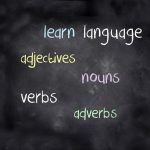5 Awesome Expressions and Collocations Activities to use with Groups of English Language Learners
I’ve already written about why English language learners should learn collocations. In recent times, I’ve begun to turn my attention to what it really means to be a ‘lexical teacher’. Anyway, if you’re looking for a variety of collocations activities and exercises to use with groups of learners, you’re in the right place.
Activities based on Collocations, Expressions and Fixed Expressions
I have selected the following five expressions and collocations activities on the grounds that they have exceptional teaching and learning value.
1. Finding Collocations in a Text
This first activity aims to exploit the collocational content of any text.
As a reference point, here’s one of my texts which I have used with students in recent years:

(a) As a first step, ask learners to underline all the single word nouns. If the text is a long one, you can break it down into sections so that one group of students focuses on just one section or several paragraphs.
In the text above, single word nouns include:
- uncertainty
- citizenship
- rights
- backgrounds
- research
- family tree
- interest
- genealogist
(b) Now get learners to underline the verb or adjective which is used before the noun. Examples from the text include:
- Polish citizenship
- future rights
- hire a genealogist
- carry out research
- dual citizenship
- educational backgrounds
- take an interest
- start a family tree
(c) Now that learners have some collocations to work with, get them to underline any whole phrases in which collocations are used:
- obtain (Polish) citizenship (by descent)
- hold dual citizenship
- take an interest (IN something)
Further notes:
The beauty of stages (b) and (c) is that learners would reread the same collocations, and whole phrases containing the collocations, multiple times. Therefore, there is an abundance of explicit focus on form going on here. This may certainly enable input to become intake, that is language data (input) that has been noticed, attended to and processed.
The idea for this activity was found in:
Hill, J., et al, (2000). ‘Classroom strategies, activities and exercises’, in Lewis, M., (ed.) Teaching Collocation: Further Developments in the Lexical Approach, Hove, England: Thomson Heinle Language Teaching Publications ELT, p.88-117
Download the text - 'A long time coming' - with definitions
2. Fixed Expressions
The next of our expressions/collocations activities encourages learners to notice the exact words in a fixed expression.
Either individually or in pairs, get students to correct the wrong word. As a follow up, students can write the equivalent of the expression in their mother tongue.
This straightforward exercise can be used to follow up hearing or reading a dialogue or watching a video or talk. I have selected ten expressions from Jamie Oliver’s TED Talk - Teach every child about food:
Expressions (one incorrect word in each expression)
- you’re at the top in your game
- move your hands up
- he's fed up on it
- They're doing a best they can do
- easiest said than done
Solutions
- you’re at the top OF your game
- PUT your hands up
- he’s fed up WITH it
- They’re doing THE best they can do
- EASIER said than done
The idea for this activity was found in:
Lewis, M., (2008). Implementing the Lexical Approach: Putting Theory into Practice, Andover, England: Heinle
3. Related verbs
According to Lewis (2008, p.97):
It is the use of similar words in familiar expressions which helps distinguish one from the other(s).
Therefore, this exercise type encourages teachers to take words with similar meaning, and then make a list of expressions in which one of the words is used.
I've recently begun making use of corpora in my classes. Indeed, I'm a particular fan of the British National Corpus (BNC), and that is where I have taken the sentences below from:
Exercise:
Complete the following sentences with the appropriate form of speak, tell, say, talk:
- I hadn't expected to be able to _____ to Alan before the end of the week, but at a quarter to five Sylvia de Groot telephoned to say that he was free now if I still wanted to see him
- She _____ fluent Italian and spent part of each year in Bari, in the south of Italy, where she had lectured in English at the university for ten years
- Marcus thought about writing to his father but knew he didn't have anything to _____ to him
- He has _____ me he loves my daughter and bitterly regrets the affair which, he says, he couldn't stop because the girl was blackmailing him and threatening to tell his wife
- … let's _____ about all the men that Claire's been hanging out with
- He said the police were _____ to everyone Angie had seen in the two weeks before she... well... vanished, and so far had come up with nothing
- We all like to think that we can _____ the truth, but we all bend our answers to the ears of the particular listener
Solutions
- speak
- spoke
- say
- told
- talk
- talking / speaking (speak = slightly more formal)
- tell
The idea for this activity was found in:
Lewis, M., (2008). Implementing the Lexical Approach: Putting Theory into Practice, Andover, England: Heinle
4. The Collocation Game
For this activity, choose a noun which possesses a large number of adjective or verb collocates.
Tell the learners that all the words you read out collocate with the same noun, which they must try to guess.
Learners should write down the collocates you read out. If a learner thinks they know the noun, they can shout it out. The game can be competitive in that two points can be awarded for a correct guess, while one point can be deducted for each incorrect guess.
This activity only works properly if you choose the order of the words carefully, moving from more general words to stronger collocates. Here are some examples which are more suitable for upper-intermediate level learners of English:
1. plain, dark, white, butter, milk, bar of chocolate
2. collect, provide, volunteer, conceal, gather, withhold information
3. summer, exotic, bank, annual self-catering, package holiday
4. year, loss, allowance, bracket, haven, evasion tax
5. huge, growing, profitable, export, domestic, black market
The idea for this activity was found in:
Hill, J., et al, (2000). ‘Classroom strategies, activities and exercises’, in Lewis, M., (ed.) Teaching Collocation: Further Developments in the Lexical Approach, Hove, England: Thomson Heinle Language Teaching Publications ELT, p.88-117
5. Collecting Collocations
Of all the collocations activities out there, this one brings home to learners just how many words collocate with a word they already know.
As teachers, you need to be looking out for interesting nouns which, for example, may collocate with a large number of verbs.
Instructions:
- Read out a list of around 10 verbs which may collocate with the target noun
- Ask learners to note all the correct collocates as you read
- Use seven or eight correct words, especially half-familiar words. Add two or three others which do not make correct collocations
Examples:
money: borrow, change, earn, *gain, invest, make, *reduce, save, spend
economy: boost, *break, *do, expand, kick, start, run, steer, stimulate
home: get, go, leave, flee, come, travel, drive, arrive, *comfort, *increase
* non-collocates
Comments:
This activity provides an opportunity to remind learners of words they often overuse such as do, make, have, take.
The idea for this activity was found in:
Hill, J., et al, (2000). ‘Classroom strategies, activities and exercises’, in Lewis, M., (ed.) Teaching Collocation: Further Developments in the Lexical Approach, Hove, England: Thomson Heinle Language Teaching Publications ELT, p.88-117
Final Thoughts
Hill et al. (2000, p.116) warn teachers of some of the pitfalls of writing their own collocations activities and exercises. Namely, collocation is never as simple as it seems. For example, sometimes the adverb must come in front of the verb, sometimes it must come after, and sometimes either position is possible with very similar meanings.
In recent times, I’ve developed gap fill exercises for students based on sentences found in corpora, such as the British National Corpus (BNC). Typically, I’ve put a great deal of emphasis on building students’ knowledge of the wide collocational fields general nouns possess. Hill et.al (2000, p.16) rightly point out that learners “think they ‘know’ these words, but they are a source of many mistakes when learners (mis-)use them in speech and writing.”
Another point is that learners overuse common delexical verbs, such as take, do, have and get, when they don’t know the appropriate verb collocate of a particular noun. For example, learners may wrongly say “do a complaint” instead of “make a complaint”. Therefore, a decent proportion of collocations activities should pay heed to collocations containing delexical verbs.
References
Lewis, M., (ed.) (2000) Teaching Collocation: Further Developments in the Lexical Approach, Hove, England: Thomson Heinle Language Teaching Publications ELT
Lewis, M., (2008). Implementing the Lexical Approach: Putting Theory into Practice, Andover, England: Heinle



